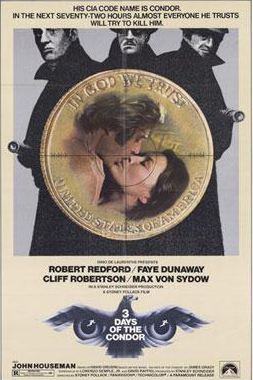One Director, Two Thrillers, Three Decades. . .and One Line of Dialogue. Two of my favorite movie thrillers are by the same director, a pair of films made thirty years apart.

On some levels they couldn’t be more different. Condor, of course, was based on James Grady’s masterful debut novel. The Interpreter didn’t even have a script when Nicole Kidman and Sean Penn signed on to do the film. In fact, according to Pollack’s comments in the DVD version of the film, the script was actually written as the film was being shot. (And yes, there are a couple of plot holes that are probably attributable to this little fact.)
But they are both stylish and thoughtful thrillers, both set primarily in New York City, and dealing with intricate political conspiracies. Plus, they feature two of the most suspenseful scenes on film—though the scenes (as I’ll explain in a moment) couldn’t be more different. In Condor, Robert Redford is Joe Turner, code-named Condor, a reader-researcher for a CIA outpost in New York. He turns up what he thinks is a secret operational network, writes up a report, and dutifully sends it up the line. When he is out to lunch one rainy day, all his co-workers (including his girlfriend) are murdered. He returns, finds them, and goes on the run, spending the rest of the film attempting to figure out what is happening and kidnapping a woman he encounters at random (Faye Dunaway).
The scene that gives me chills from Condor, every time I watch it, takes place in an elevator. Turner is on the run. Another friend has been murdered before his eyes. He has gone to his friend’s apartment, talked with the friend’s wife—who doesn’t know what has happened to her husband. She thinks he’s working late. Turner tells her to leave, to the apartment of other friends, and stay there. She doesn’t understand. He forces her to the elevator and puts her in it. As she gets in, a tall, well-dressed gentleman steps off. Turner then waits for the next elevator. When it arrives, the tall man gets right back on with Turner.
The tall man (played brilliantly by Max von Sydow) rides down with Turner. Other people get on and off, until they are alone in the elevator. Turner knows something is wrong—why did the man get off, then get right back on the elevator? The tension mounts, and by the time the elevator lands on the ground floor, Turner knows this is the assassin sent to kill him. There is no action, little dialogue, just an excruciating tension between two fine actors. By the time the elevator doors open—with Turner insisting the other man leave the elevator first—I always find that I have been holding my breath. It is exquisite suspense.
In The Interpreter (watch HD trailer here), Nicole Kidman portrays Silvia Broome, a United Nations translator who may or may not be more than she seems. She overhears what she believes to be a threat against the life of the president of Matobo, her fictional African homeland. The president is a one-time liberator, now a tyrant. She learns the dictator is coming to make an address at the U.N. and reports the threat. 
The Secret Service becomes involved, and Sean Penn is outstanding, with a weathered, understated way about him as Tobin Keller, the weary agent whose estranged wife was recently killed in a car accident. A relationship unfolds between Broome and Keller, and no, it doesn’t fall into the cliché of romance or sex. But a relationship nonetheless, as Keller tries to discern what is real and what is imagined.
The scene that leaves me breathless here is when three different aspects, and three sets of characters, converge on a bus in Brooklyn. Broome confronts an influential exile from her country, while at the same time, an assassin (who turns out to be in the pay of the country’s president) boards the bus as well—with Secret Service agents shadowing him.
The shots keep cutting between these different points of view, interspersed with Keller and his partner, in radio contact. They have broken into the apartment of a suspect—a partner of the assassin, now on the bus—and discovered explosives. The scene begins to shift very quickly between the sets of characters, with Keller finally telling his man in the field to “get everyone off that bus.” Broome gets off the bus, as does the assassin, leaving behind a sack.
“Guy forgot his lunch,” says a passenger, and the bus explodes. The exiled leader is killed, along with one of the agents and dozens of passengers. Broome is injured, though not seriously. The conspiracy comes to a head. The conflict and tension escalate. The assassination plot is revealed to be a con, a bit of political theater meant to justify the president’s harsh actions.
Both of these films feature fine plot twists, and Pollack elicited excellent performances from his actors in both. They aren’t classics, but Three Days of the Condor and The Interpreter, with thirty years between them, show a director who knew how to create suspense, and how to use it in the service of storytelling.
Oh, and that line of dialogue? In Condor, it’s Redford’s character speaking to Cliff Robertson, a CIA superior. In The Interpreter, it’s Sean Penn to Nicole Kidman, after the bus explosion: “You think not getting caught in a lie is the same thing as telling the truth!”
Was the repetition intentional? Was Pollack even aware of it? It’s hard to believe a director of his talent wouldn’t be, though he never commented on it. In Interpreter, was it a nod toward his earlier work? Perhaps fittingly, Interpreter turned out to be Pollack’s last film as a director, with that subtle—conscious or not—reference to a much earlier movie. We’ll never know if the repetition of the line was intentional. But Sydney Pollack showed a fine hand in both these films, and they are worthy of inclusion on any list of top movies in the thriller genre.
B. Kent Anderson’s new historical-political thriller, Cold Glory, which includes a few subtle references to his own earlier works written under the pseudonym David Kent, will be published by Forge in October 2011. www.bkentanderson.com

I watched Condor recently on Blu Ray and was taken back to the 70s when I first saw it. Great movie. Understated tension. And one of the most shocking opening 10 minutes I’ve ever seen. I read the book (which gave Condor 5 days instead of three) before it was adapted for the screen and the movie more than did it justice. Even changing the McGuffin that sparked the whole thing (I can’t remember what it was in the book.) And of course Redford was in his prime. A thoughtful post. Congratulations.
LOVE Pollack’s films, for sure, and 3 Days does it for me everytime I see it. Really enjoyed your post, and who does NOT love Max von Sydow!
And, of course, watching Three Days of the Condor NOW, and hearing what the plot Redford’s character uncovers — well, if you’re the sort of person who laughs at irony, you will get a deep belly chuckle out of THAT.
I first saw this film back in 1976. The next time was in 2002. Both viewings had me captivated from start to finish even though, second time around, there were parts which I remembered from the first time. Robert Redford (“Condor”) works for the CIA as a reader/researcher. His job, along with others, is look for new ideas or plots published in books or journals around the world in all languages. He turns up a well authored scheme in a journal printed in a variety of strange languages and reports to his superiors.